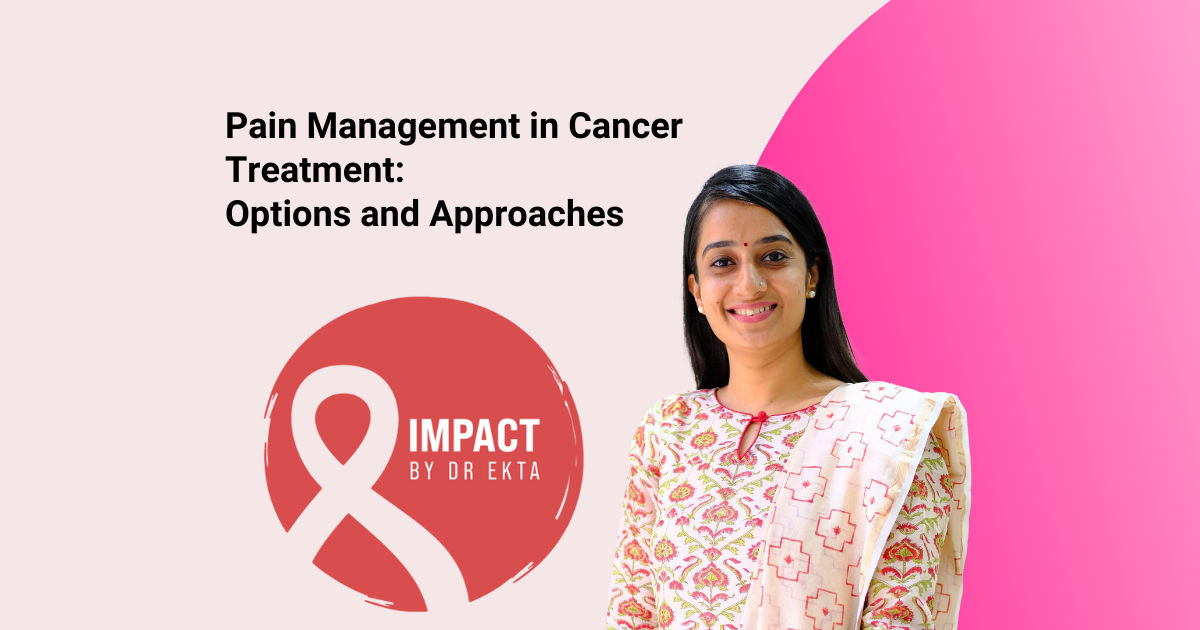Pain is a reality many cancer patients face, and as an oncologist, one of my top priorities is to ensure that pain is effectively managed throughout treatment. Pain management is a crucial part of cancer care because untreated or poorly managed pain can significantly impact a patient’s quality of life, emotional well-being, and overall recovery. Let’s delve into the options and approaches to pain management in cancer treatment, breaking down the myths and highlighting the facts.
Why Pain Management Matters
Pain is not just a symptom it’s a condition that requires its own treatment plan. Cancer-related pain can arise from several sources:
- The tumor pressing against nerves or organs.
- Side effects of treatments such as chemotherapy, radiation, or surgery.
- Pre-existing conditions exacerbated by the stress of cancer.
Managing this pain is essential not just for comfort but for enabling patients to focus on their treatment and recovery. Adequate pain management can make a significant difference in how a patient copes with their illness.
Types of Pain in Cancer Patients
Understanding the type of pain is the first step toward effective management. Cancer pain is often classified into three main categories:
- Acute Pain: This is short-term pain often linked to treatments like surgery.
- Chronic Pain: This lasts for extended periods, often due to the tumor itself or long-term side effects of treatment.
- Breakthrough Pain: Sudden, intense pain episodes despite ongoing pain management efforts.
Each type of pain requires a tailored approach, which is why a comprehensive pain management plan is critical.
Options for Pain Management
Pain management in cancer treatment is not a one-size-fits-all solution. It involves a combination of approaches, customized to the patient’s needs, medical history, and cancer type.
- Medications
Medications are often the first line of defense against cancer-related pain. These include:
- Non-Opioid Analgesics: Drugs like acetaminophen or NSAIDs for mild to moderate pain.
- Opioids: Medications like morphine, oxycodone, or fentanyl are used for moderate to severe pain.
- Adjuvant Medications: These include antidepressants or anticonvulsants for nerve-related pain.
It’s important to note that concerns about opioid addiction should never deter appropriate use for cancer-related pain. When managed properly under medical supervision, these medications are both safe and effective.
- Radiation Therapy
For pain caused by tumors pressing on nerves or bones, radiation therapy can help shrink the tumor and relieve discomfort. This approach is particularly effective for localized pain. - Nerve Blocks and Injections
Nerve blocks involve injecting medication directly around nerves to interrupt pain signals. This method can provide long-lasting relief for patients with severe, localized pain. - Integrative Therapies
Incorporating integrative therapies can complement traditional pain management approaches. These include:
- Acupuncture: Effective for reducing certain types of cancer-related pain and treatment side effects.
- Massage Therapy: Helps alleviate muscle tension and stress-related pain.
- Mind-Body Techniques: Practices like meditation, yoga, and guided imagery can help patients manage the emotional aspects of pain.
Personalized Pain Management Plans
Every patient’s experience with cancer pain is unique, and so should their pain management plan. When I work with patients, I emphasize a multi-disciplinary approach. This involves collaborating with pain specialists, palliative care teams, and rehabilitation experts to address every aspect of the patient’s pain.
Some patients may benefit from advanced techniques like implantable pain pumps or spinal cord stimulators. These devices deliver medication or electrical impulses directly to the affected areas, providing targeted relief.
Addressing Emotional and Psychological Pain
Cancer pain isn’t always physical. The emotional and psychological toll of living with cancer can exacerbate the perception of pain. Anxiety, depression, and stress can make pain feel more intense, which is why addressing these aspects is just as important.
Psychotherapy, support groups, and counseling are invaluable tools for helping patients navigate the emotional challenges of cancer treatment. I also encourage patients to maintain open communication with their care team about any emotional struggles they may face.
Dispelling Myths About Pain Management
There are many misconceptions about pain management in cancer care, and these myths can prevent patients from seeking the help they need.
- Myth: “Pain is inevitable in cancer.”
Truth: While pain is common, it is not something patients have to endure silently. Modern medicine offers a wide range of solutions. - Myth: “Opioids will make me addicted.”
Truth: When used appropriately under medical supervision, opioids are highly effective and safe for cancer-related pain. - Myth: “Pain management is only for end-of-life care.”
Truth: Pain management is essential at every stage of cancer treatment, not just during palliative care.
Empowering Patients Through Education
One of the most empowering tools I can offer my patients is education. Understanding the sources of their pain and the available treatment options helps them feel more in control of their care. It’s also vital to involve family members in these discussions, as they play a critical role in providing support.
I often remind patients to:
- Speak openly about their pain levels during consultations.
- Keep a pain diary to track patterns and triggers.
- Advocate for themselves if they feel their pain isn’t being adequately addressed.
The Future of Pain Management in Cancer Care
Advancements in cancer pain management continue to evolve. Research into novel treatments like targeted therapies and precision medicine holds great promise for more effective and personalized care.
Emerging approaches like gene therapy and non-invasive neuromodulation are currently under investigation, and they have the potential to revolutionize how we treat cancer-related pain in the future.
Final Thoughts
As an oncologist, my goal is not just to treat the cancer but to ensure that my patients can live with dignity and comfort throughout their journey. Pain management is a critical component of comprehensive cancer care, and I urge patients to never hesitate in seeking help for their pain.
By working together, we can develop a plan that addresses your unique needs and helps you focus on what truly matters: your recovery, your loved ones, and your quality of life.

